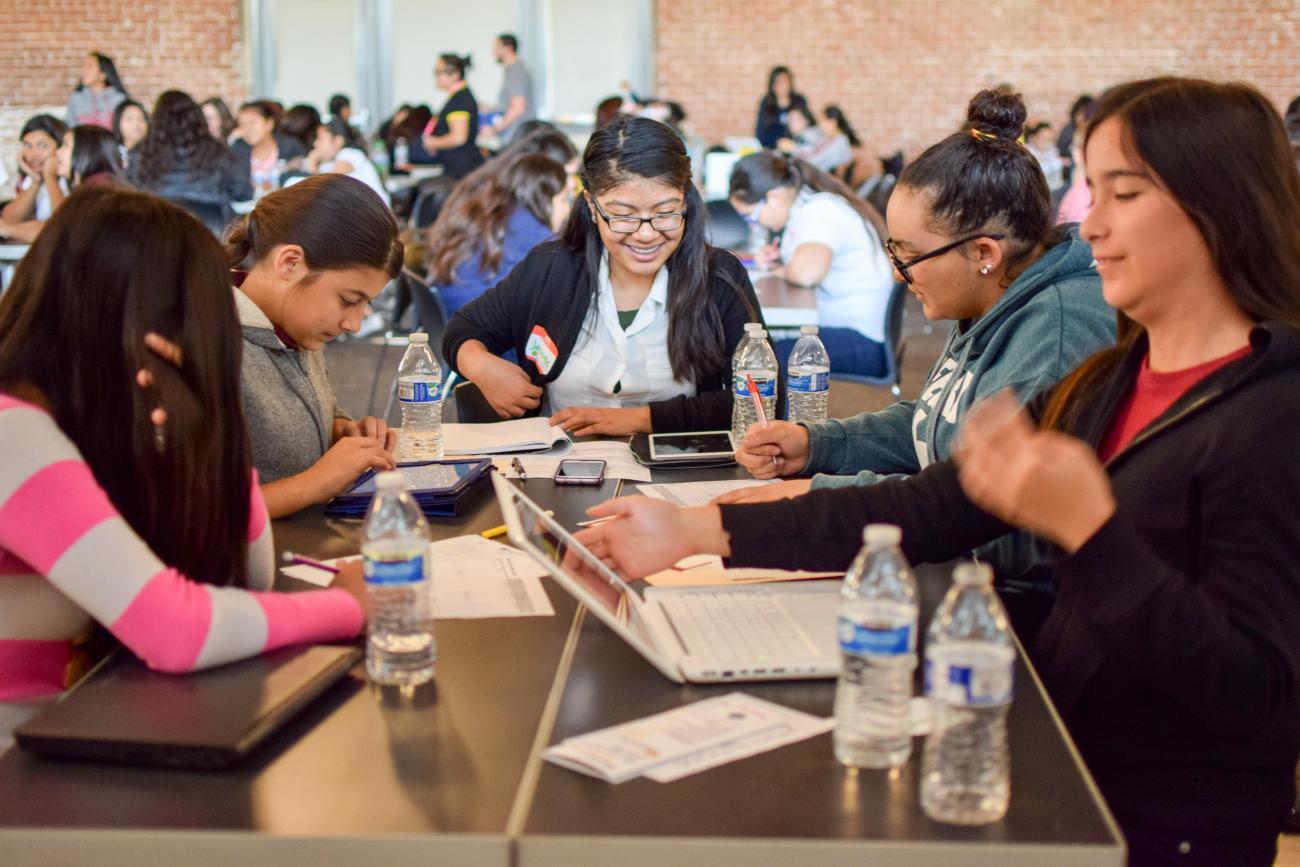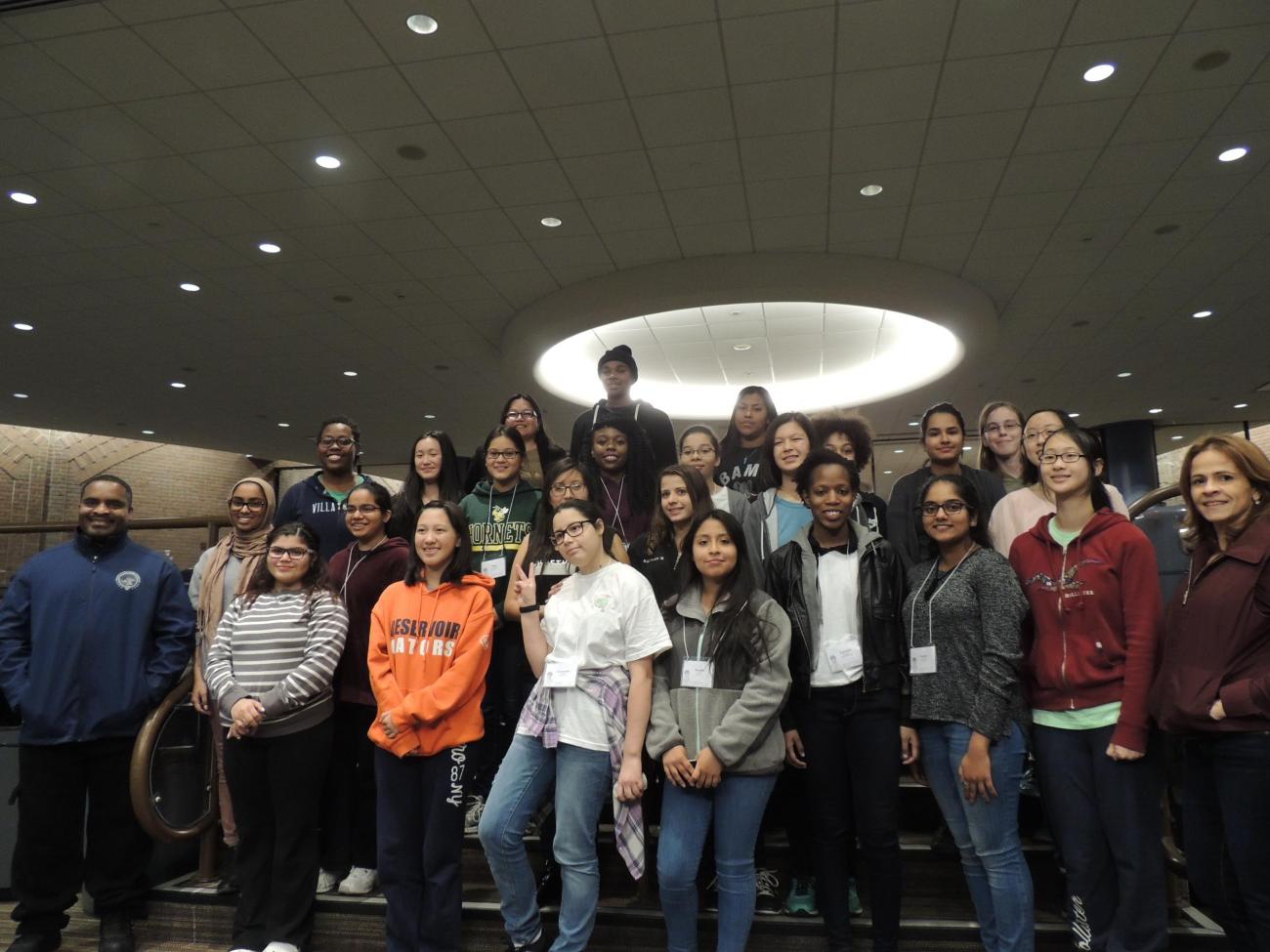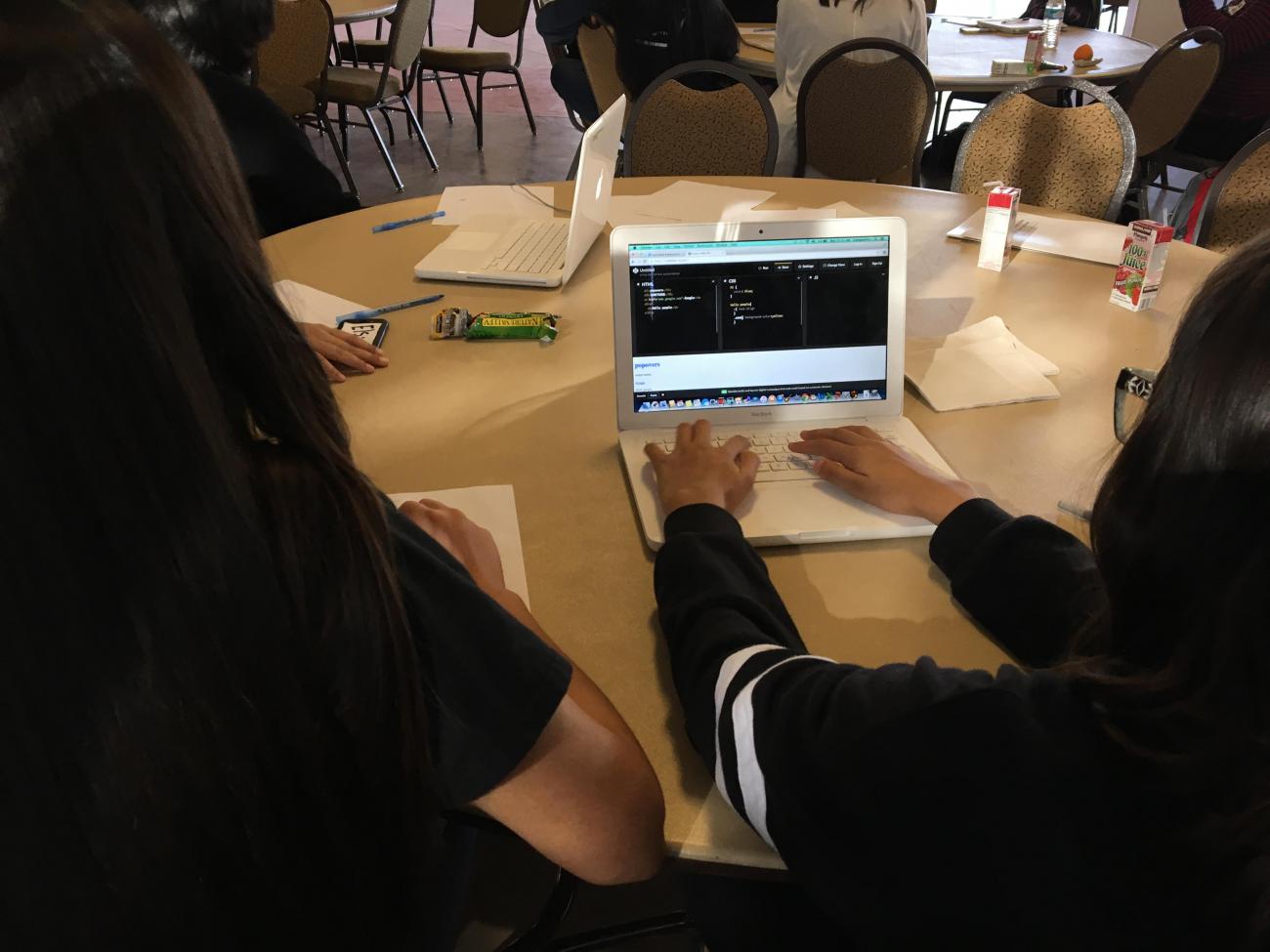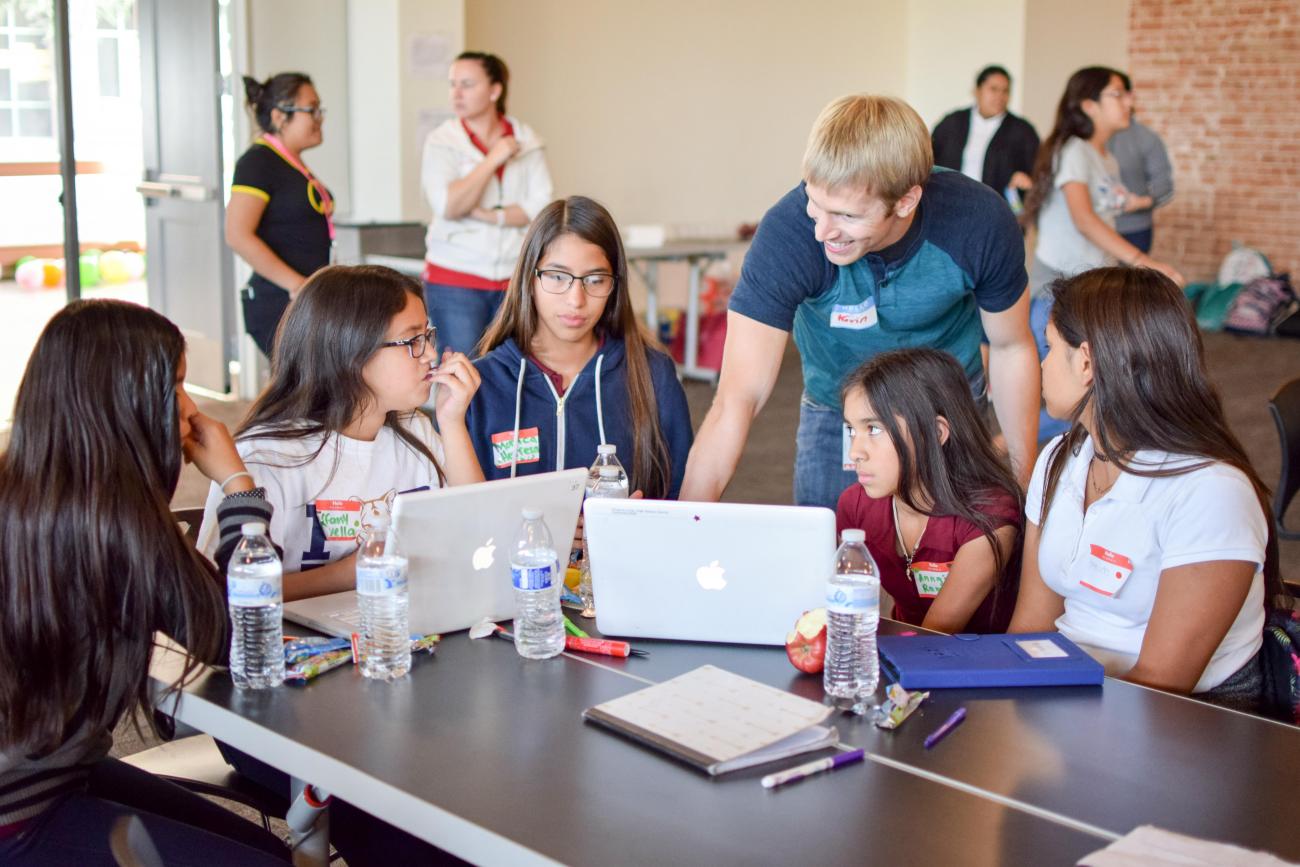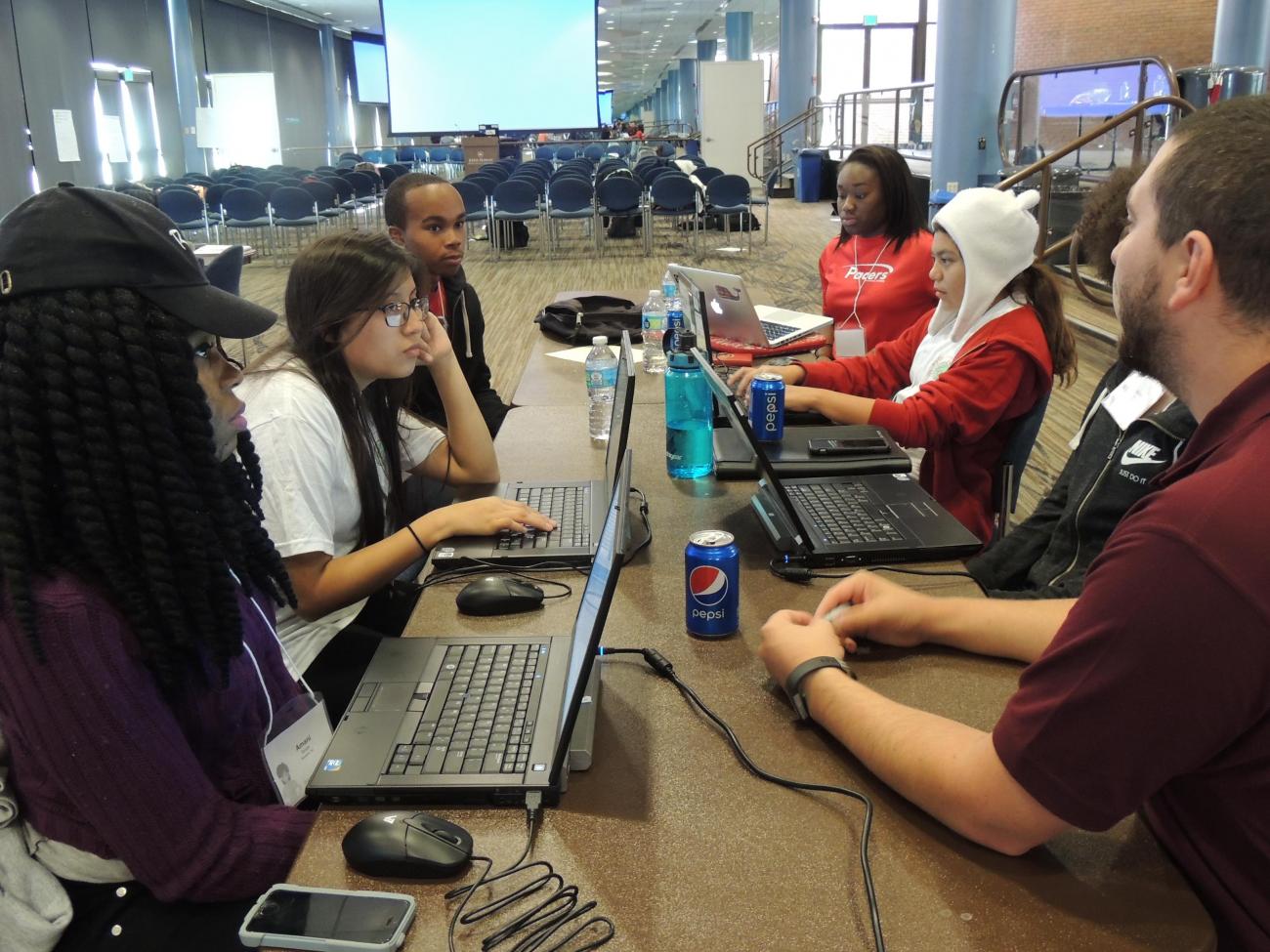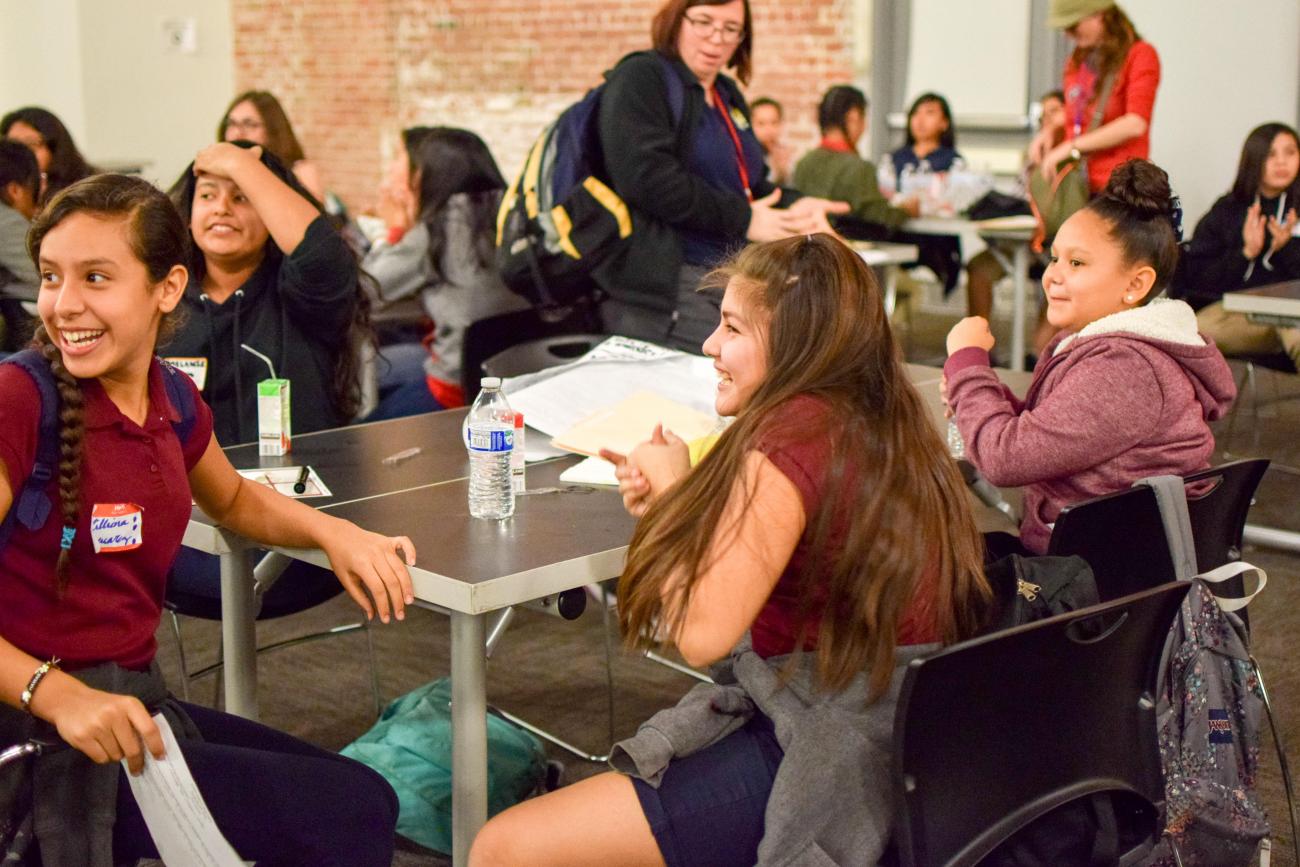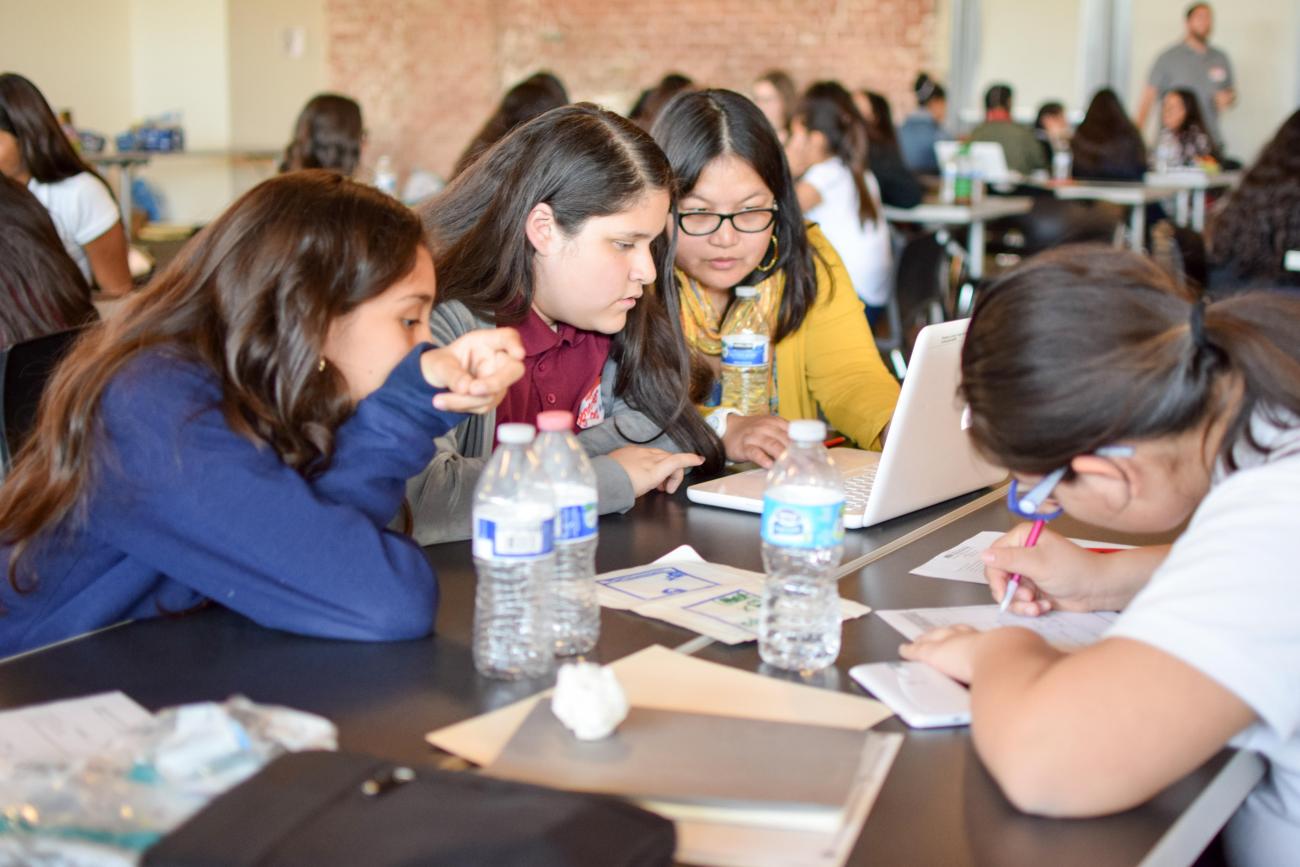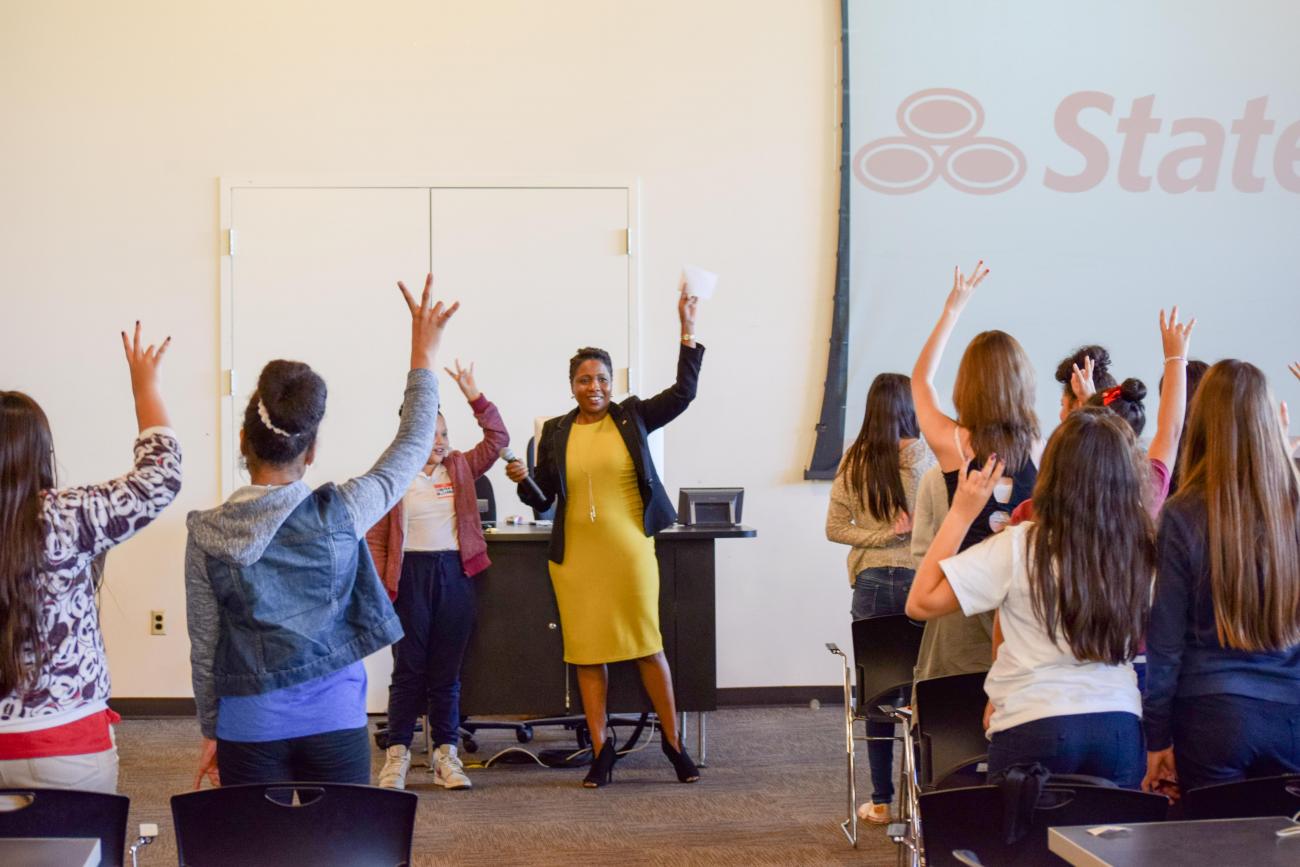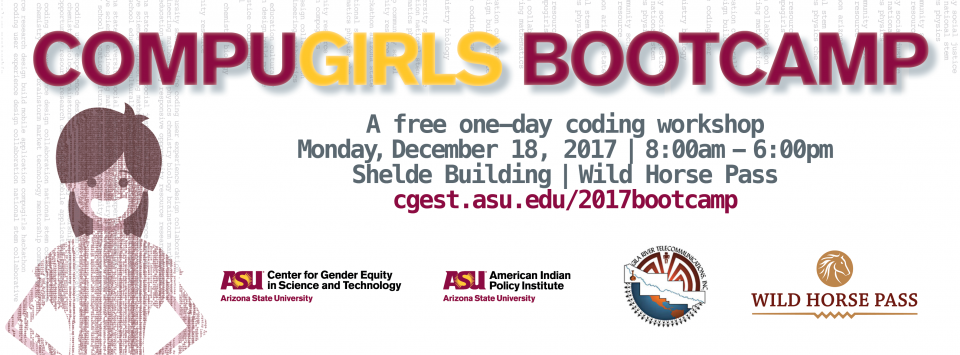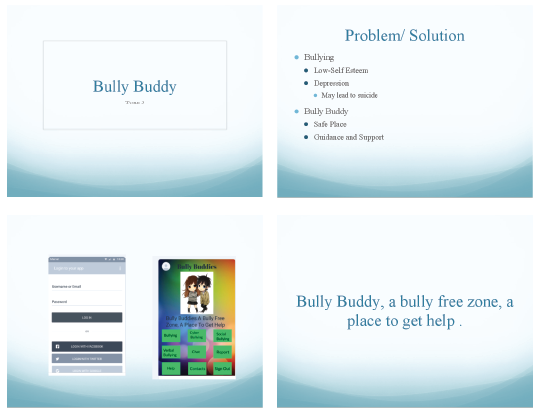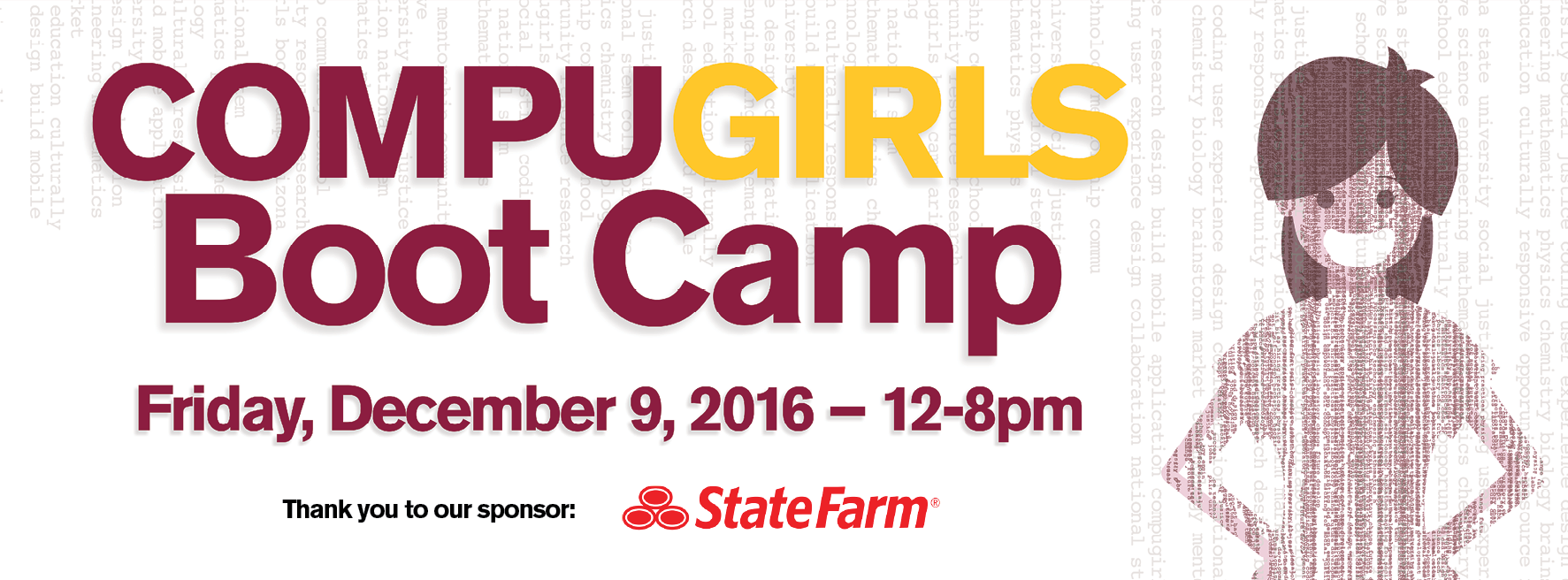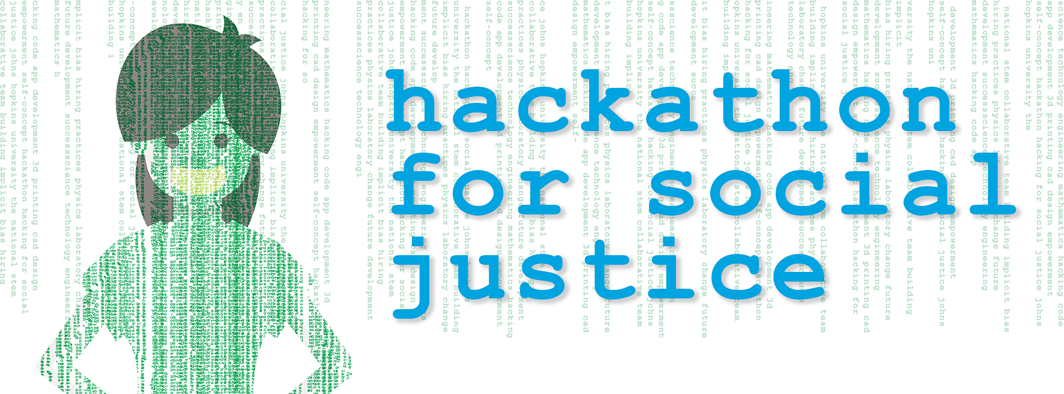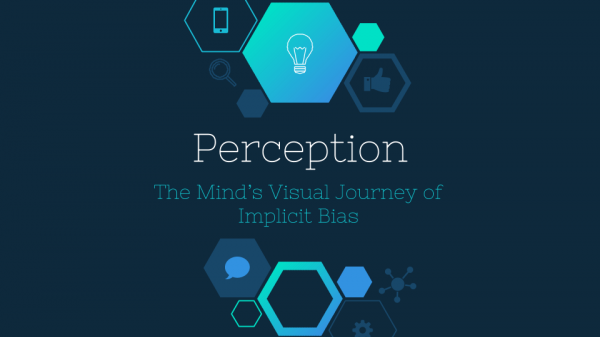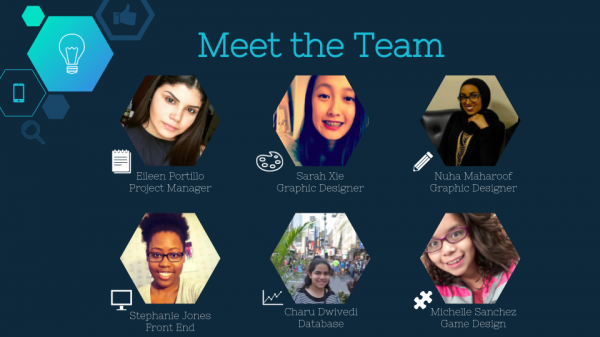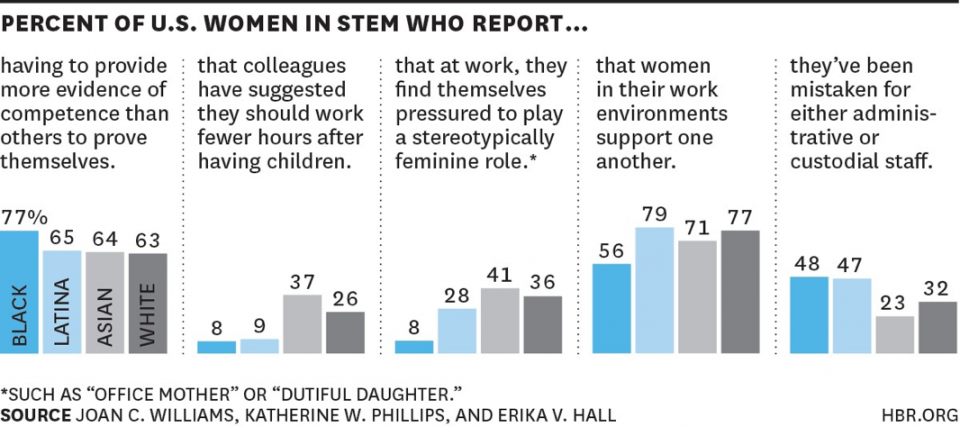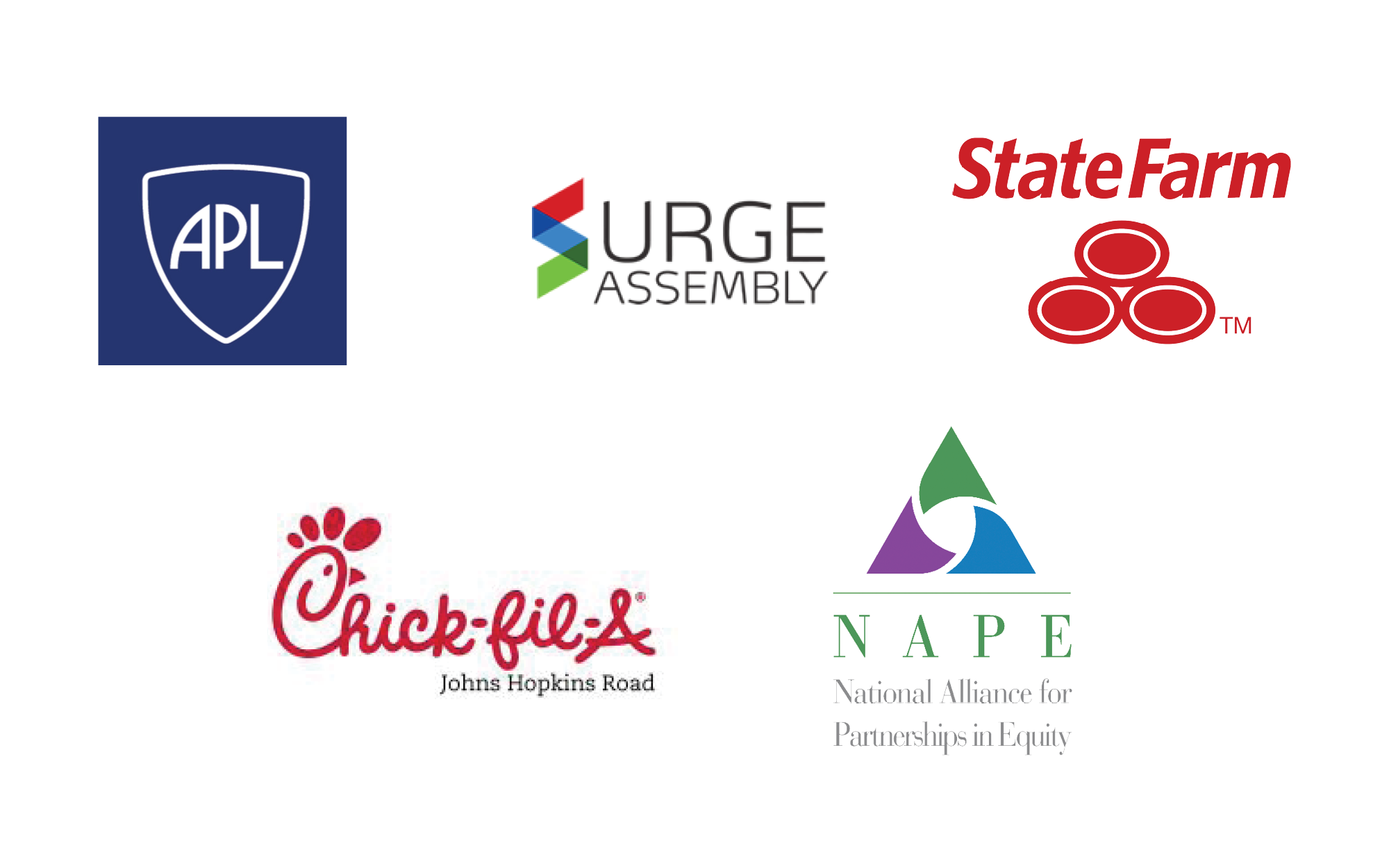Past Programs and Events
The CompuGirls Hawai`i Camp welcomed 26 new campers and 6 peer mentors to Hawai`i Pacific Universityʻs downtown campus at Aloha Tower for our week-long residential camp. Campers came together from O`ahu, Maui, and the Big Island to learn about cybersecurity, computer science and app coding, astronomy, marine science, and ecology.
From our first night, there was an obvious sense of teamwork among this cohort of campers! Upon arrival, we were able to gather and talk story to learn more about each other and the camp staff. Then, groups broke away in the dorms with their mentor teachers to have ice breaker sessions and create posters of their chosen “rules of engagement,” or how they wanted to treat each other and themselves for the duration of the camp.
Each group then shared their posters with the larger group and discussed their expectations for the week. These activities set the stage for a week of learning alongside one another in respectful and engaging ways.
This event took place June 4-10, 2023.

Learn, Lead, and Lunch: Visits to Cyber Hubs on Three Hawaiian Islands
CompuGirls Hawai`i offered localized experiences this summer for students interested in cybersecurity and computer science on three different islands. The Learn, Lead, and Lunch event invited students to visit cyber hubs on their own island to meet mana cyber wāhine (women cyber leaders) in computer science and information technology.
On Maui, students visited the Maui High Performance Computing Center and the Maui Economic Development Board led by Tiare Martin and Dr. Robyn Garner.
On O`ahu, students visited the Information Technology Center and East-West Center (EWC) at the University of Hawai`i at Mānoa and met with Jodi Ito (CISO of UHM), Suzy Vares-Lum (President of EWC), and Connie Lau (retired President of HEI).
On Hawai`i Island, students visited the `Imiloa Astronomy Center, and meet with Ka`iu Kimura, executive director.
A statewide CompuGirls Summit on July 8, 2022 brought together former and new CompuGirls from the various islands to engage in hands-on learning experiences with local young professionals from the cyber sector.

Computer Programming 1A
In collaboration with ASU Prep Digital CompuGirls Hawai`i invited students to enroll in a course on Computer Programming 1A for the month of June 2021. The course was held completely online where students are completing the program at their own pace with CompuGirls staff is assisting with understanding, reviewing, and general questions about the content of the course weekly on Wednesdays throughout the month (five sessions total).
The course introduced 14 students to computer programming with a journey starting in careers and responsibilities in programming, traveling into data representation and execution, landing squarely in computer programming, and culminating in web programming.
During the tutoring sessions, CompuGirls had the opportunities to interact with each other while being introduced to upcoming content and debriefing recently completed content. The young ladies were able to work individually, with a partner, and/or small groups to work on short assignments allowing them to apply their recently learned knowledge and skills, as well as engage with upcoming content through prior knowledge recall.
Hawai`i students in grades 8-12 were invited to apply for the CompuGirls Hawai`i Spring Camp 2021, a free virtual program aimed to introduce and educate Hawai`i students underrepresented in STEM (Science, Technology, Education and Science) education to cybersecurity and information technology (IT). Students are participating in nine two-hour sessions on consecutive Saturdays from Feb. 20 – April 24, 2021 and have been provided with full access to the curriculum and activities.
The Spring Camp includes the use of innovative technologies such as Gather.Town, a virtual space for students to interact more effectively online combining video-calling with a 2D map, and micro:bit, a pocket-sized computer that introduces how software and hardware work together. In addition, students are being introduced to cryptography: the practice of encrypting and decrypting data; the role of ciphers in cybersecurity: guessing the cipher key to reveal encrypted data; whether cracking ciphers is ethical; and much more.
Hawai`i students in grades 8 -12 were invited to apply for the CompuGirls Hawai`i Fall Camp 2020, a free virtual program aimed to introduce and educate Hawai`i inidivudals underrepresented in STEM (Science, Technology, Education and Science) education to cybersecurity and information technology (IT). Students are participating in six three-hour sessions on consecutive Saturdays that started October 17th, 2020.
The fall camp allowed students to hear and learn from current cyber leaders, explore the fields of cybersecurity and IT while exploring their communities' cybersecurity needs. The participants were able to explore and learn through interactive games and hands-on activities while developing the skills to prepare for a successful college degree program and career in the cybersecurity and IT fields.
Thank you to the students, teachers, mentors, and sponsors that made the 2017 CompuGirls Bootcamp possible!
Congratulations to the students who created the anti-bullying app "Bully Buddy." Winning students were awarded scholarships to the 3rd Annual Women of Color STEM Entrepreneurship Conference that will take place March 1-3, 2018 at ASU Polytechnic campus in Mesa, AZ.
Event Details
Students from 7th - 12th grade were encouraged to participate in the 2017 CompuGirls Bootcamp, a 10-hour workshop that challenged teams to research, design, and build a mobile application prototype that addresses a real problem in their communities, while mentors from industry and academia provided feedback and support.
What:
- A community of students, mentors, industry experts, and activists came together to create social change through technology
- An environment that encouraged learning, collaboration, engagement, and dialogue about real issues and real solutions that affect underrepresented girls and women in STEM. Teams worked together to research, design, and build a web app prototype under the guidance of experts and mentors
- A reflection of the remarkable talent, limitless potential, and vested interest that students of color possess as well as the need for opportunities and resources to empower them to persist in STEM academically and professionally
Group project:
- Groups will design an app under the guidance of mentors
- Each team member will have a specific role to fulfill
- Each team will create a logic model or business plan
- Teams will create an app prototype or blueprint
- All apps will be designed to address a social justice issue
- The app will be utilized to (1) increase awareness about the issue, or (2) provide a real solution
When:
Monday, December 18, 2017
8:00 am - 6:00 pm
Where:
Gila River Indian Community
Anthony B. Shelde Community Building
5718 West North Loop Road Chandler, AZ 85226
Who:
CompuGirls Boot Camp welcomed students from diverse backgrounds, disciplines, and skill levels to come together for a collaborative exercise in innovation, community building, learning, and social change. No prior coding or app development experience was necessary. Although we strongly encouraged girls and women of color to apply, the hackathon welcomed any person who advocates for race and gender equity in STEM.
Event Details
About:
On behalf of the Center for Gender Equity in Science and Technology (CGEST) at Arizona State University (ASU), we thank you for attending our COMPUGIRLS One-Day Boot Camp, an event during Computer Science Education Week (CSEdWeek). Our center is committed to providing a culturally responsive computing program for adolescent (ages 13-18) students from high needs districts. We accomplished this by ensuring that our program was consistent with our empirically-based program, COMPUGIRLS, which offers a culturally responsive computing experience that provides participating students access and opportunity to acquire the technical and “power” skills –namely, how to present an argument, build a coalition, design solutions to a problem, and further one’s community (Scott, in press)-- necessary for them to enter and persist in STEM.
When:
Friday, December 9, 2016
12:00 PM - 8:00 PM
Where:
Arizona State University Downtown Phoenix campus
A. E. England Building
424 N. Central Ave.
Phoenix, AZ 85004
Target Audience:
Up to 100 middle and high school aged girls
Program Synopsis:
CGEST held a CompuGirls One-Day Boot Camp for up to 100 middle and high school-aged students. Participation was on a first-register-first-serve basis. During this 8-hour event, teams worked together to research, design, and build an app prototype that addressed a real problem specific to their communities, while mentors from industry (e.g. State Farm, Intel, Google) and academia (e.g. Arizona State University, Maricopa Community Colleges) provided feedback and support.
Event Flyer
Thank you to our sponsor:
Congratulations to the Winning Team!
Watch the Hackathon for Social Justice - App Demo from ASU CGEST on Vimeo.
Event Details
What:
During this 36-hour Hackathon for Social Justice, teams of 6 students worked together to research, design, and build a web app prototype while mentors from industry and academia provided feedback and support. The web app primarily functions as an interactive learning tool to help learners identify and address implicit bias in the recruitment, hiring, and promotion of STEM faculty. This participatory educational platform helped facilitate a more inclusive process and provided institutions of higher education and STEM industries strategies to diversify their faculty and workforce.
When:
The hackathon started at 7 am on Saturday, November 19 and ran through 7 pm on Sunday, November 20.
Where:
Johns Hopkins University Applied Physics Lab
Kossiakoff Center
11100 Johns Hopkins Road, Laurel, Maryland 20723
Campus map
Who:
The Hackathon for Social Justice was a signature program of the National STEM Collaborative in partnership with Johns Hopkins University Applied Physics Laboratory and Surge Assembly.
The National STEM Collaborative (NSTEMC) is a consortium of higher education institutions and non-profit agencies committed to advocating for individuals of color to persist and succeed in STEM both academically and professionally. Housed in the Center for Gender Equity in Science and Technology at Arizona State University, NSTEMC engages scholars, policy makers, industry professionals, and community activists in programs that amplifies meaningful dialogues and advances the movement to provide more opportunities and resources to underserved and underrepresented groups in STEM disciplines and industries.
The STEM Program Management Office at the Johns Hopkins University Applied Physics Laboratory centers on helping more students realize their potential in STEM-related fields. Making sure more diverse, talented STEM professionals are prepared for APL and other Central Maryland organizations to hire is also at the top of our list. By developing problem solvers and critical thinkers who can make much-needed contributions in STEM, APL is making an investment in our country’s future workforce and ensuring that America’s next generation of STEM professionals is well prepared for the nation’s challenges ahead.
Formerly PinStripe Consulting, founded in 2003 and headquartered in Washington, DC, Surge Assembly is an established and trusted provider of digital, logistical and management services for both non-profits and commercial organizations. Their core service offerings include Design & Technology Integration, Management Support Services, Logistics & Operations and Staff Augmentation. Through community impact, Surge Assembly staff spends thousands of hours each year giving back, through hands-on service, board service, and pro bono consulting.
Why:
The National Bureau of Economic Research conducted a study revealing how teacher bias early in a student's education has significant effects on her later success in STEM subjects, including whether or not she chooses to take classes in those subjects in high school (Lavy & Sand, 2015). African American and Latina adolescents express more interest in STEM careers than their White counterparts; yet, relatively fewer enter and persist in STEM majors and in the workforce (NSF, 2012, 2013).
A study on Gender Bias Against Women of Color in Science (Williams, Phillips, & Hall, 2014) indicates that gender and race play a role in driving women out of science careers (see table 1). According to the National Science Foundation (2012, 2013), minority women comprise fewer than 1 in 10 employed scientists and engineers with only 5 percent of Asian women, 5 percent of African American women, less than 1 percent of Native American women, and 2 percent of Hispanic women represented in the science and engineering labor force in the U.S. This compares poorly with women as a whole, which made up 28 percent of all workers in science and engineering occupations in 2010.
The National STEM Collaborative through the Center for Gender Equity in Science and Technology at ASU seeked to help fix the leaky pipeline by addressing Implicit Bias in recruitment, hiring, and advancement practices in post-secondary STEM disciplines. By gathering relevant studies and resources, conducting focus groups, and synthesizing collected data, the research team designed a curriculum content that enabled learners to identify, reflect on, and address their personal implicit biases. The content was developed into an intuitive web application that was deployed to hiring professionals and search committees.
This participatory education helped facilitate a more inclusive process and provided institutions of higher education and STEM industries strategies to diversify their faculty and workforce. The prototype(s) created during this hackathon have the potential to make a lasting impact on the culture and landscape of STEM academia and industry for generations of girls and women of color.
Event Flyer
We want to give a special thank you to our sponsors:
